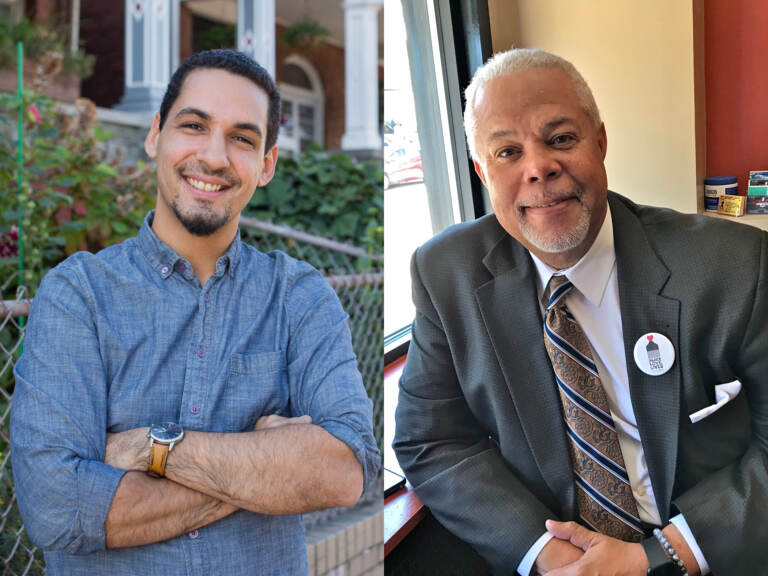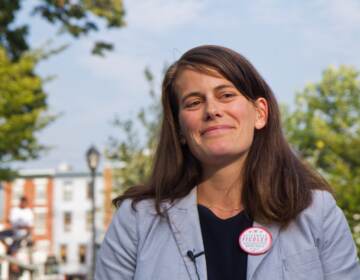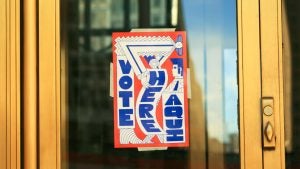Sen. Anthony Williams, 23-year incumbent, has his first real challenger. He says it’s ‘insulting’
Progressive Paul Prescod is running to unseat longtime Sen. Anthony Williams. Williams says Prescod is “from a band of socialist Democrats.”
Listen 5:07
Sen. Anthony Williams (right) is facing a primary challenge this year from Paul Prescod. (Prescod campaign; Jennifer Lynn/WHYY)
After 23 years in Pennsylvania’s state Senate, Anthony Hardy Williams, one of the most powerful Democrats in Harrisburg, has his first-ever serious primary challenger.
On May 17, Williams will face Paul Prescod, a young union organizer and former public school teacher who is challenging the incumbent from the left. The race has featured raucous public meetings, accusations of carpetbaggery and political amorality, and intense campaigning of a kind the 8th Senate District hasn’t seen in decades. The district covers West Philly, part of South Philly, and part of Delaware County.
It’s the latest in a string of races in which upstart progressive groups, which have grown in power in Philadelphia since the 2016 election, have mounted serious challenges to established Democrats by arguing that the incumbent is ineffective.
Williams, who is 65 and serves as Senate Democratic Whip, says he is annoyed about the whole thing.
At a Saturday afternoon neighborhood event in Southwest Philadelphia, Williams — in the kind of suit he usually wears on the Senate floor — was surrounded by kids running to and from a bouncy castle and volunteers handing out soft pretzels and free food bags.
But his mind was on the primary. He called the challenge “insulting.”
It’s coming, he said, “from a band of socialist Democrats, or [whatever] they want to name themselves, who think they’re here to speak for people who are Black and brown by saying things like, ‘increase the minimum wage, we want probation reform.’”
“But they don’t know a damn thing about what that really means because they never worked in these neighborhoods without pay,” he said. “That’s what’s insulting.”
Insider, outsider
That’s the argument at the core of Williams’ pitch to voters: he’s from this district, his family is from here, and he knows his job well.
Though he started his career in the private sector, working as an executive at Pepsi, Williams transitioned to politics in his early 30s and never left. He won his first race for state representative in 1988, then took the 8th Senate District in an uncontested 1998 race after his father, Hardy Williams, retired from the seat. Over the years, he has also made two unsuccessful bids for mayor and one for governor.
He makes the case that all his time in Harrisburg has given him a keen sense of how to eke out victories in a GOP-controlled legislature. It’s all about “pragmatism,” he says.
But that’s exactly what Prescod and his supporters say is the problem with Williams: that his brand of political pragmatism — common among many of Pennsylvania’s Democratic senators, who have been in the minority for decades — no longer works for the 8th District.
“People really feel things are in a deep crisis like never before,” Prescod said in an interview outside a West Philly coffee shop. “Issues like gun violence and underfunded schools, unfortunately, are nothing new in Philadelphia. But I think what feels different now for people is that they can’t remember the last time it’s been this bad in so many areas. They feel like there’s been a lack of leadership.”
Prescod, who is 31, isn’t from Philly — something, he said, that really only comes up when Williams and his supporters argue it disqualifies him from the Senate.
He grew up in Montgomery County, with a dad who immigrated to Pennsylvania from Barbados. He went to Temple, got involved in labor organizing, and became a Philadelphia public school teacher. Until last year, he taught ninth and tenth grade social studies.
He is indeed endorsed by the Democratic Socialists of America, and also by Reclaim, a group that grew out of Bernie Sanders’ 2016 base in Philadelphia and has since helped push a number of progressive, mostly young candidates to victory. He also has backing from longer-established groups, including the Working Families Party and Philly Neighborhood Networks, plus several AFSCME, Teamsters, American Postal Workers, and American Federation of Teachers locals.
He points to gun violence as a top issue in his campaign, and like Williams, says the city needs more funding for basic things, like rec centers and after school programs. But the centerpiece of his bid for Senate — and perhaps the thing that most sets him apart from Williams — has been education.
The Yass factor
Williams is a staunch supporter of school choice — that is, giving parents the ability to send their kids to publicly-funded charter schools, or to private schools via publicly-funded scholarships. Republicans broadly support such policies, and they’re a longstanding point of contention among Democrats, both in Philadelphia and across Pennsylvania.
“Yes, I’m very supportive of options,” Williams said. “Especially for poor people who don’t have the money [to get into a good public school district] like middle class folks and rich people do.”
The way he sees it, charter schools and public scholarships are a stopgap. He says he has seen Democrats try and fail for years to route more money to Philadelphia’s notoriously underfunded public schools, and a fair funding formula that lawmakers enacted with much fanfare in 2016 remains far from taking full effect.
“What am I supposed to do?” he asked. “Wait 20 years again?”
Williams’ school choice advocacy has also gotten him a lot of campaign support. For years, he has been accepting big campaign contributions from PACs funded by Jeffrey Yass, a Montgomery County billionaire charter school advocate who generally supports Republicans. Yass’s annual tens of millions in donations have recently been tied to campaigns across the country, including those of Texas Sen. Ted Cruz, Missouri Sen. Josh Hawley, and Pennsylvania Rep. Scott Perry.
That has been one of Prescod’s most frequent criticisms of Williams: that he hasn’t done enough during his decades in power to actually improve Philly public schools, and that he is compromised by his financial reliance on donors like Yass.
Prescod doesn’t blame parents for sending their kids to charter schools, he said. “But I think we have to realize there’s a broader agenda here…why is someone like Jeffrey Yass — the wealthiest person in the state, the biggest funder of Republican candidates, [involved in] right wing think tanks — why is this person so interested? Why is this the person who’s my opponent’s biggest funder?”
Yass’s interest in Philly politics, Prescod said, is “about ultimately privatizing our schools, attacking teachers’ unions…We can’t act naïve. Like, if they’re giving to a Democratic incumbent, they’re getting something in return for that money.”
Yass distributes his money through a broad network of PACs. On May 2, Williams reported his latest big donation from one of them: $10,000.
Prescod noticed. On Twitter, he wrote that “for me to raise $10,000, I have to spend an average of 50 hours calling supporters and asking them to contribute to our campaign.”
“I wouldn’t have it any other way,” he added. “I’m proud that our campaign is powered by working people: teachers, postal workers, city workers, UPS drivers. And I’m proud NOT to be supported by a Republican like Jeffrey Yass.”
Williams maintains that the money doesn’t matter.
“Don’t criticize me because of where I get money to run a campaign,” he said. “You want me to tie both hands behind my back and hamper myself to run an effective election? I’m not going to do that.”
Prescod’s own funding has mostly been small donations. In the most recent reporting period, his biggest contributions were $5,000 from Philadelphia Democratic Socialists of America, and another $5,000 from Teamsters Local 623.
Apart from Yass, many of Williams’ big funders are also unions. He got another $10,000 and $25,000 respectively from PACs for District Council 21, and the Laborers’ District Council.
A matter of experience
On a warm Sunday a few weeks before the primary, Prescod and his campaign staff met in Southwest Philly’s Elmwood Park with a group of dedicated supporters for a training session, before they scattered for a few hours of door-knocking.
Most were young, and many were affiliated with groups like Reclaim and Philadelphia’s chapter of the Democratic Socialists of America. Not all grew up in Philly.
Kani Mote, who has been involved with Prescod’s campaign since February and now serves as field director, said it’s irritating when Williams and his supporters suggest that because of their backgrounds, Prescod and his supporters don’t understand the district well enough.
“I mean, I’m an immigrant, queer person of color,” they said. “I have been told my whole life that I’m a transplant wherever I go…Williams actually grew up in West Philly and hasn’t done anything for the community and has actually just made himself richer. And that is the thing that fuels me.”
But for some voters, it does matter where a candidate is from. At the weekend community event at Kingsessing rec center, Williams was surrounded by people who saw his long history in the district as a point in his favor.
One of them was Eric Riddick, who was holding the inaugural event of his community development group, the Emergency Response Foundation. Williams has known Riddick’s family since Riddick was a kid. They stayed in touch when, in 1991, Riddick was convicted of a murder he says he didn’t commit. He spent nearly 30 years in prison before his release last year, when the District Attorney’s office said his original trial had been unfair and vacated his conviction.
Since he’s been out, Riddick has jumped into local organizing. He sometimes disagrees with Williams — he thinks a probation reform bill Williams is backing, for instance, doesn’t go nearly far enough — but mostly feels good that someone like him is in office.
“He’s been here, Riddick said. “He could have moved out of southwest Philadelphia years ago, but he remained here so that he can keep a finger on the pulse of the people in the community.”
These are the feelings that could end up deciding the campaign. And sometimes, the question of experience versus a fresh perspective has left onlookers torn. That’s what recently happened in West Philly’s 27th Ward, which encompasses University City and parts of Spruce Hill, Cedar Park, and Squirrel Hill.
The 27th is one of the few wards in the city that endorses candidates through an open voting process among committee members. While a number of wards with more opaque endorsement structures have backed Williams, longtime 27th Ward leader Carol Jenkins noted that Prescod seemed like a natural fit for her education-focused area.
Committee members in the 27th have long clashed with Williams over his support for charter schools. Prescod “has been an educator himself in public education,” Jenkins said. “He’s been an organizer. He had strong support from the teachers’ union.”
The ward heard from both candidates for the first time at a public meeting. It was tense.
Williams arrived with a crowd of supporters who, both Prescod and Jenkins recalled, shouted throughout the remarks and criticized Prescod for having not been born in Philadelphia. But despite being irritated at the disruptions, Jenkins emerged grudgingly impressed with Williams, who she said “handled himself very well,” while she thought Prescod struggled to make the case for his candidacy.
“It just didn’t seem to us that he was there yet,” she said. “He might get there, maybe, in the future, but he didn’t seem to have enough of a grasp of the politics of Harrisburg or the political world at all, that he could be a strong voice for us.”
The negatives for both candidates, she said, were ultimately too significant.
The ward opted not to make an endorsement.
WHYY is your source for fact-based, in-depth journalism and information. As a nonprofit organization, we rely on financial support from readers like you. Please give today.









